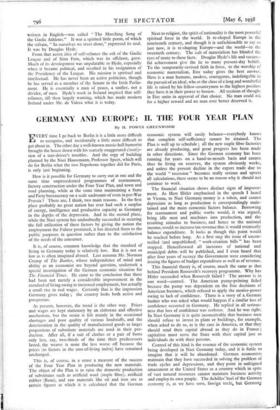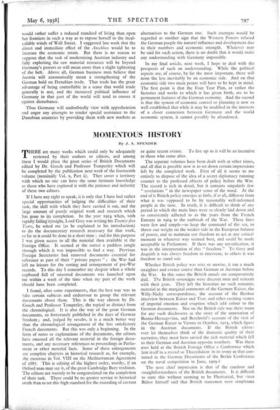GERMANY AND EUROPE: II. THE FOUR YEAR PLAN
By H. POWYS GREENWOOD
EVERY time I go back to Berlin it is a little more difficult to recognise, and incidentally a little more difficult to get about in. The other day a well-known music-hall humorist brought the house down with his scarcely exaggerated Cescrip- tion of a taxi-driver's troubles. And the orgy of building planned by the Nazi Haussmann, Professor Speer, which will do for Berlin what the two Napoleons together did for Paris, is only just beginning.
How is it possible for Germany to carry out at one and the same time unprecedented programmes of rearmament, factory construction under the Four Year Plan, and town and road planning, while at the same time maintaining a State and Party bureaucracy on a scale undreamt-of even in pre-War Prussia ? There are, I think, two main reasons. In the first place probably no great nation has ever had such a surplus of energy, intelligence and productive capacity as Germany in the depths of the depression. And in the second place, while the Nazi system has undoubtedly succeeded in securing the full utilisation of these factors by giving the nation the employment the Fiihrer promised, it has directed them to the public purposes in question rather than to the satisfaction of the needs of the consumer.
It is, of course, common knowledge that the standard of living in Germany today is relatively low. But it is not so low as is often imagined abroad. Last autumn Mr. Norman Crump of The Banker, whose independence of mind and ability as an economist are beyond question, undertook a special investigation of the German economic situation for The Financial Times. He came to the conclusion that there had been not merely a considerable improvement in the standard of living owing to increased employment, but actually a small rise in real wages. Certainly that is the impression Germany gives today ; the country looks both active and prosperous.
At present, however, the trend is the other way. Prices and wages are kept stationary by an elaborate and effective mechanism, but the strain is felt mainly in the occasional shortages and poor quality of various foodstuffs, and the deterioration in the quality of manufactured goods as larger proportions of substitute materials are used in their pro- duction. After all, if a suit of clothes or a pair of boots only last, say, two-thirds of the time their predecessors lasted, the wearer is none the less worse off because the prices (as factors in the cost-of-living index) have remained unchanged.
This is, of course, in a sense a measure of the success of the Four Year Plan in producing the new materials. The object of the Plan is to raise the domestic production of substitutes such as artificial wool (staple fibre), artificial rubber (Buna), and raw materials like oil and iron ore to certain figures at which it is calculated that the German economic system will easily balance—everybody knows that complete self-sufficiency cannot be attained. The Plan is well up to schedule ; all the new staple fibre factories are already producing, and great progress has been made in other directions. Since the German economy has been running for years on a hand-to-mouth basis and cannot thus be living on reserves, the system obviously works, and unless the present decline in the export trade due to the world " recession " becomes really serious and upsets all calculations, there seems to be no reason why it should not continue to work.
The financial situation shows distinct signs of improve- ment. As Herr Hitler emphasised in the speech I heard in Vienna, to Nazi Germany money is a token, and cannot depreciate as long as production is correspondingly main- tained and the main economic factors balance. Borrowing for rearmament and public works would, it Was argued, bring idle men and machines into production, and the resulting stimulus to business, and hence to the national income, would so increase tax-revenue that it would eventually balance expenditure. It looks as though this point would be reached before long. As a first step the issue of uncon- trolled (and unpublished) "work-creation bills" has been stopped. Henceforward all increases of national and municipal debts will be published, and I even heard that after four years of secrecy the Government were considering issuing the figures of budget expenditure as well as of revenue.
This financial theory is, of course, much the same as that behind President Roosevelt's recovery programme. Why has Hitler succeeded when Roosevelt failed ? The answer is in one word—control. The American pump-priming failed because the pump was dependent on the free decisions of American business, which refused to apply the motive-power owing to lack of confidence. There is a story of a. German banker who was asked what would happen if a.similar loss of confidence occurred in Germany. He replied in all serious- ness that loss of confidence was verboten. And he was right. In Nazi Germany it is quite inconceivable that business men should refuse to invest in plant or buildings, for example, when asked to do so, as is the case in America, or that they should send their capital abroad as they do in France ; capitalists must serve the State with their capital just as individuals do with their persons.
Control of this kind is the essence of the economic system being developed in Nazi Germany today, and it is futile to imagine that it will be abandoned. German economists maintain that they have succeeded in solving the problem of trade cycles and depressions, and they point in unfeigned amazement at the United States as a country which in spite of vast natural resources cannot maintain business activity and employ its own people. The Achilles' heel of the German economy is, as we have seen, foreign trade, but Germany would rather suffer a reduced standard of living than open her frontiers in such a way as to expose herself to the incal- culable winds of Wall Street, I suggested last week that the direct and immediate effect of the Anschluss would be to increase the economic strain. But there is no reason to suppose that the task of modernising Austrian industry and fully exploiting the raw material resources will be beyond Germany's powers or will mean more than a slight tightening of the belt. Above all, German business men believe that Austria will automatically mean a strengthening of the German hold on Danubian trade. That trade has the great advantage of being controllable in a sense that world trade generally is not, and the increased political influence of Germany in that part of the world will tend to ensure it against disturbance.
Thus Germany will undoubtedly view with apprehension and anger any attempts to render special assistance to the Danubian countries by providing them with new markets as alternatives to the German one. Such attempts would be regarded as another sign that the Western Powers refused the German people the natural influence and development due to their numbers and economic strength. Whatever may be said for such action, there is no doubt that it would make any understanding with Germany impossible.
In my final article, next week, I hope to deal with the prospects of such an understanding. While the political aspects are, of course, by far the most important, there will none the less inevitably be an economic side. And on that economic side two main points will have to be kept in mind. The first point is that the Four Year Plan, or rather the factories and works to which it has given birth, are to be permanent features of the German economy. And the second is that the system of economic control or planning is now so well established that while it may be modified in the interests of a closer connexion between Germany and the world economic system, it cannot possibly be abandoned.



































































 Previous page
Previous page